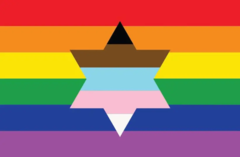Unlocking your Children’s Full Potential
08/01/2022 08:55:23 AM
Director of Youth & Family Engagement
Unlocking Your Children's Full Potential Through Jewish Learning
For every Jewish soul in the world, I hope for one of two things: that they find Judaism, or that Judaism finds them. I was the latter case. Until fourth grade, I despised going to religious school. I missed the first month of my fourth grade year because my mother was tired of my attempts to not go, telling me it was my decision to back out of a Jewish education. Thankfully, Judaism wasn’t ready to let me go so easily. People from my temple began questioning my absence, and I could tell my mother was disappointed. I took this as a sign to give religious school one last shot. This decision was probably the best of my life. During the rest of the year I came to appreciate my teachers, make friends, and I even went to camp for the first time that summer. The realization that Jewish community is something special finally clicked for me.
Now, I am going into the 2022/2023 year as the teacher of my own fourth grade class. As someone who wasn’t always thrilled about religious school in my youth, I take my experiences from K-12th grade into account when developing lesson plans for my students. I strive to make the learning in my classroom feel real and worthwhile. On top of that, there are other motivations like creative art, engaging games, and opportunities for bonding with peers. One thing that frustrates kids in religious school programs is to show up on Sunday morning and feel like they have wasted their time. Whether it is hearing about something they’ve already been taught, or filling two hours of class time without much learning at all. Such factors can make curious kids view religious school as simply a place that forces them to wake up early on weekends.
During childhood, minds are more like sponges than like sieves. I remember at the end of last year, when I gave my students the assignment of creating their own biographies of Torah characters. Even the kids who seemed distracted during our lessons had remembered the key components from the stories I told during the lecture portion of class. This brings me to my second philosophy about learning in a Jewish context. It’s not only possible that our children can learn a lot about Judaism, they actually might want to, and such knowledge will serve them well for the rest of their lives.
I use myself as an example. When I went to college, I often felt confused when other Jews would talk about Judaism. Although I grew up in a Reform synagogue, I felt there were gaps in my Jewish knowledge. For instance, I didn’t know the meaning of pareve, some holidays’ traditions were foreign (Hello, what’s Tisha B’av and why is every Jew on campus fasting?), and I was clueless when it came to most Torah stories. There is so much to learn about Judaism. In my class last year, I created a hybrid learning model that built on existing knowledge but brought new teachings that other programs might omit entirely. I taught parts of the Abraham, Jacob, and Moses stories these 3rd through 5th graders likely hadn’t heard before. In addition, we also learned about characters like Korach and Joshua, and dove into Batya’s experience and legacy. I was later told by clergy members that they had overheard my madrichim talking about all the things they learned simply by being helpers in my class!
Taking the many lessons I learned over my first year at PTS, I am now developing my own Jewish ethics curriculum for fourth grade. It pulls from the G’milut Chasadim track from last year, but emphasizes Jewish primary sources rather than just teaching virtues. By the end of the term, students with perfect attendance should be familiar with Pirkei Avot, Shulchan Aruch, and Talmud. We’ll also be comparing and contrasting Jewish law and ethics with United States law and ethics, as well as learning about what makes a tzaddik in both history and the students’ personal lives. I am extremely excited that my students will be exposed to new texts and ideas that are often overlooked in Reform Jewish synagogues. We’re going to go way beyond tikkun olam in my class!
There are so many avenues today for children to explore Judaism. Camp, temple, or hanging out with Jewish friends are just a few examples. I believe that once a child finds their Jewish niche, they are well on their way toward building Jewish identity that will inform their actions in the future. We have so much going on at PTS for kids of all ages, not just elementary-aged students. I want everything we do not to feel like “extra school,” but to feel like a place where children can explore their Judaism for life!






